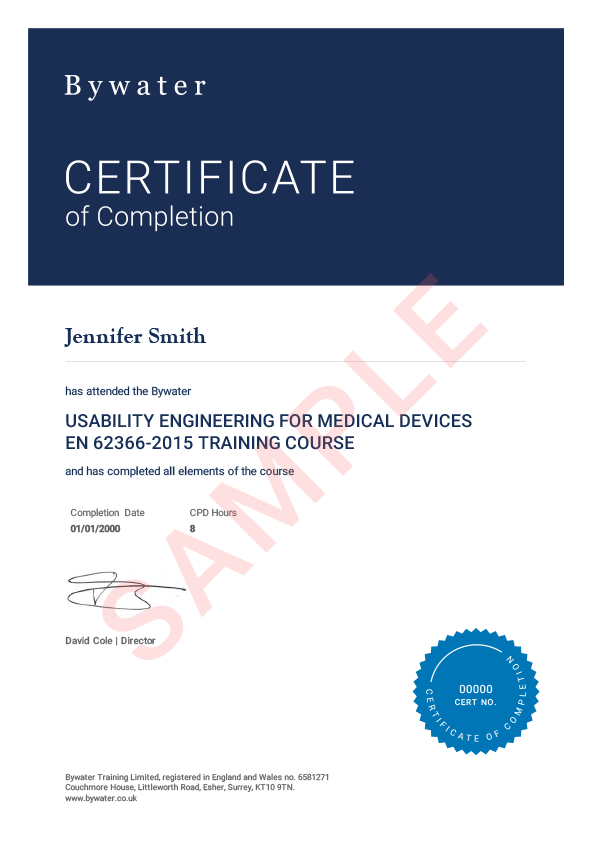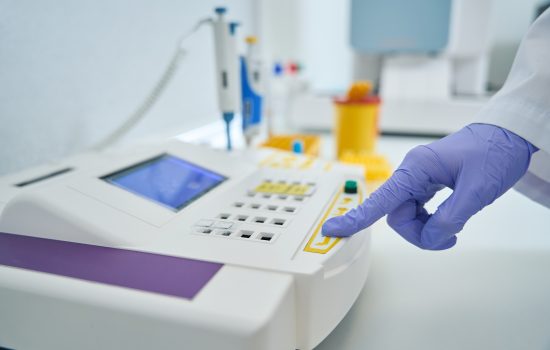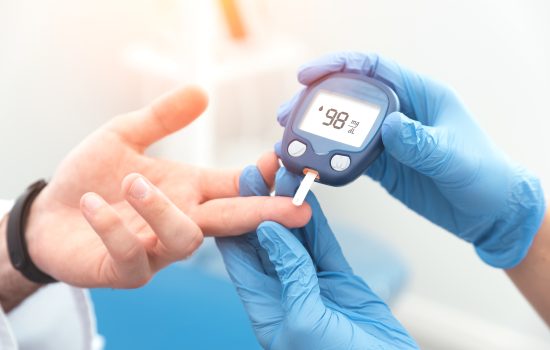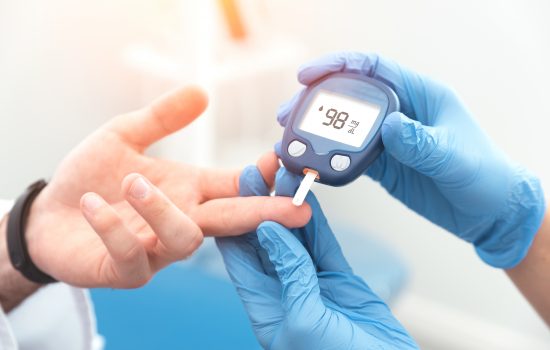BS EN 62366 Usability Engineering for Medical Devices
DURATION
1 dayCPD
Equivalent to 8 hoursCERTIFICATES
All delegates will receive a certificate on completion.DELIVERY OPTIONS
Gain an understanding of usability engineering and how it should be applied to medical devices by attending this BS EN 62366 Usability Engineering training course.
Delegates will learn how to expand their current risk management activities to ensuring the user interface of their medical devices is safe and effective, in line with the expectations of the EU and FDA in the US.
- R&D managers/engineers
- RA/QA managers/engineers
- management representatives
- members of multi-discipline design teams
- members of design review teams
- ergonomic designers
- usability engineers
- product, project, and programme managers
- Internal auditors
The course complements Bywater’s range of courses applicable to the medical device industry.
- expectations of the FDA and the EU in applying usability analysis to medical devices
- applying the usability management standard BS EN 62366 to medical devices
- the relationship between ISO 14971 and the EU directive and the implications the changes represent
- usability and use errors and examples of risks associated with user interfaces
- the stages of the Usability Engineering Process
- application of usability analysis methodologies, such as FMEA, to medical devices
- principles of usability management planning in developing procedures and practices to analyse, evaluate and control usability
- sources of information and further development
- WELCOME AND INTRODUCTION
- Module 1 Background and Changes to the new Medical Device Regulation
- Module 2 Description of the EN 62366 Standard
- Module 3 FDA Requirements
- Module 4 Use specification
- Module 5 Workshop 1: Using a real product – Defining the use specification
- Module 6 User Interface Characteristics
- Module 7 Workshop 2: Using a real product – Identify User Interface Characteristics
- Module 8 Identify known or foreseeable hazards and hazardous situations
- Module 9 Workshop 3: Using a real product – Identify known or foreseeable hazards and hazardous situations
- Module 10 User Interface Specification
- Module 11 Workshop 4: Using a real product – User Interface Specification
- Module 12 Establish User Interface Evaluation Plan
- Module 13 Workshop 5: Using a real product – Evaluation Planning
- Module 14 Perform User Interface design implementation and formative evaluation
- Module 15 Summative Evaluation
- Module 16 User Interface of Unknown Origin
- Summary and Course Evaluation
- CLOSE
- apply the Usability Engineering Process in BS EN 62366 to medical devices and to conduct usability analysis to identify hazards and possible use errors
- understand how to prepare the documents for the key stages of the Usability Engineering Process: application specification, primary operating functions, characteristics relating to safety, hazard identification, usability specification, usability validation plan
A certificate of completion will be awarded to delegates who attend and fully participate in the course, which recognises their new understanding of the Usability Engineering Process.

In-company training availability
Receive this course exclusively for your organisation, either in-person at your chosen venue or online in our user-friendly Virtual Classroom.
Enjoy cost-effective flexibility and personalised learning with tailored messaging designed to address your unique business challenges.
| In-Person | |
|---|---|
| Delegate numbers | Up to 12 |
| Total fees | TBC |
| Virtual Classroom | |
|---|---|
| Delegate numbers | Up to 10 |
| Total fees | TBC |
What's included
- Delegate certificates of attendance.
- Comprehensive course materials and handouts.
- All tutor expenses and courier fees.
- Free cancellation up to 13 working days before commencement.
For courses held outside the UK or requiring significant adjustments, we will clearly inform you of any additional fees before you book.
Next steps
Find out our availability and enquire about this course by completing the form and our training team will get in touch with you.
Alternatively contact us on 0333 123 9001 or email contact@bywater.co.uk to discuss your requirements.
Enquire
Complete the following form to enquire about this course and our training team will be in touch.
As well as delivering tutorials to explain the principles of usability engineering, our expert and experienced tutors run 5 workshops across the duration of the course to enable delegates to practise applying their new knowledge to the development of a real product.
We encourage group discussion and collaboration, as well as welcoming questions to the tutor to help attendees leave the course ready to apply their learning in their work environment. As one attendee later commented: ‘It has changed the way I will work. 5 out of 5 for course tutor – very approachable, lots of useful experiences.’
Bywater runs a wide range of complementary training courses around requirements for placing medical devices in markets around the world. These include:
- Introduction to ISO 13485:2016 for Medical Devices
- ISO 13485:2016 Internal Auditor Course
- ISO 14971 Risk Analysis for Medical Devices
- Risk Analysis and FMEA for Medical Devices
We also offer training courses on standards for medical laboratories:
- Introduction to ISO 15189 for Medical Laboratories
- ISO 15189 Internal Auditor
This is the process for a manufacturer to analyse, specify, design and evaluate usability, as it relates to safety of a medical device. The usability engineering process is specifically developed to reduce everyday errors, lower risks and ensure general equipment safety. Human Factors and Usability Engineering in medical device design is also required by the FDA’s Quality System Regulation (QSR).
Customer reviews
Metropolitan Police Service|16th Apr, 2025
Utac UK Ltd|8th Apr, 2025
Utac UK Ltd|8th Apr, 2025
Vision Rt Ltd.|4th Apr, 2025
Vision Rt Ltd.|2nd Apr, 2025
AWE|1st Apr, 2025
Metropolitan Police Service|27th Mar, 2025
Animal and Plant Health Agency (APHA)|14th Mar, 2025
Nottinghamshire Police|27th Feb, 2025
Indicia Training Ltd|26th Feb, 2025
Indicia Training Ltd|25th Feb, 2025
Emsou-Fs|25th Feb, 2025


